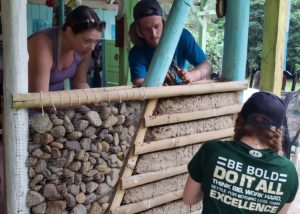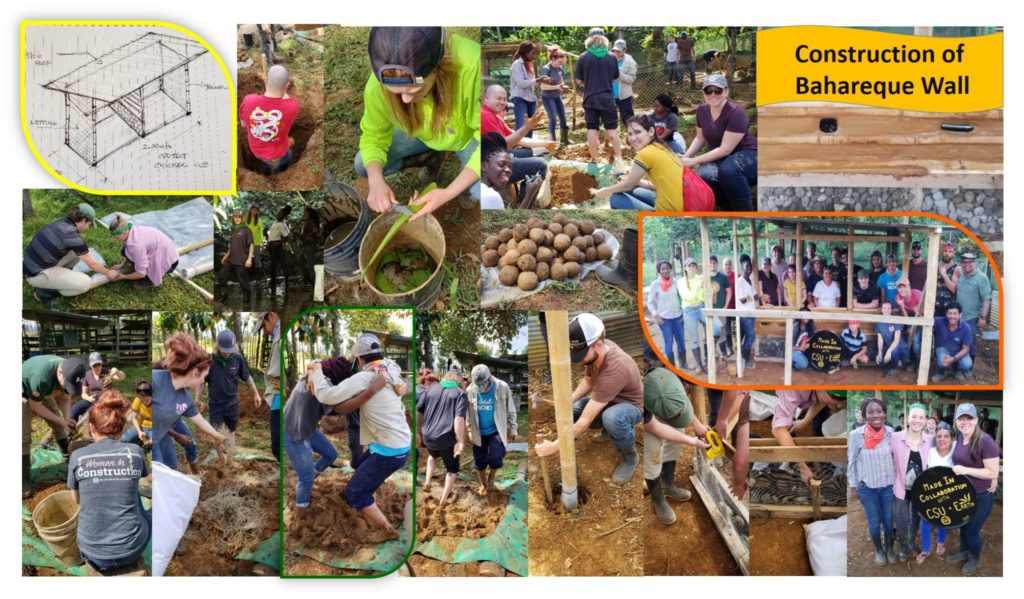
Dakota Collins is a junior majoring in construction management with a minor in global environmental sustainability. In his own words, he describes his experience on the two-week study abroad course Sustainable Buildings: Introduction to Sustainable Design and Construction – Costa Rica (CON 450), held Jan. 2-13, led by Rodolfo Valdes-Vasquez, and Mehmet Ozbek, both associate professors in the Department of Construction Management at Colorado State University.
Embark on this 12-day, fine-tuned study abroad program and you will walk away with an exceptional understanding of the principles behind sustainability. The knowledge acquired includes strategies and practices about sustainable design, construction, energy, healthy buildings, natural resources, and environmental issues. On the most recent January trip, the student body was composed of students studying construction management, landscape architecture, and agriculture. However, other majors are always welcome including interior design, business, and civil engineering.
What makes this course so incredible is the way it is structured. The course consisted of various field trips including sustainable construction sites, LEED projects, an organic coffee farm, as well as a family-run permaculture site. Did I mention our beachside classroom? Lecture sessions were presented by CSU and EARTH University professors, international business owners, local community members, and the students themselves. The course provided exceptionally diverse curriculum, remarkable classroom sites, and opportunities for students to get hands-on experience.
A memorable experience
Many elements of the course will forever live within my memories, but I would like to highlight one experience, in particular. During one of our guest presentations, we were taught about a natural building method called “bahareque.” Bahareque is a building method similar to adobe, made up of clay, sand, straw, aloe vera, and water. To mix the materials together, it works best to take off your shoes and mix them barefooted! Once you have mixed the bahareque, you can commence building with it. This method has some great attributes that make it a sustainable building choice for tropical areas. Some of the attributes behind bahareque include the following:
- Materials can be harvested on site
- Simple, renewable, maintainable
- Requires no prior building experience (age-friendly)
- Strong and fire resistant
As participants during the course, we learned this technique and applied it hands-on at one of the host family’s property. The family was having issues with their chickens getting in fights. Our team wanted to design and build something for which the family could actually benefit. The first step in the process was to listen to what the family needed. As a whole, we decided to move forth with constructing a chicken coop that could keep the different species of chickens separated, resulting in fewer fights between the chickens.
 We used bahareque for our dividing wall and bamboo for our structural columns. As a class, we designed and constructed the entire coop in one day, using materials found entirely on site. Between the 16 students, three faculty members, and host family members, this project was a collective effort. Everybody was working with the bahareque, getting their hands and feet dirty! Overall, it was an incredible experience that truly represented sustainable building through environmental, economic, and social lenses.
We used bahareque for our dividing wall and bamboo for our structural columns. As a class, we designed and constructed the entire coop in one day, using materials found entirely on site. Between the 16 students, three faculty members, and host family members, this project was a collective effort. Everybody was working with the bahareque, getting their hands and feet dirty! Overall, it was an incredible experience that truly represented sustainable building through environmental, economic, and social lenses.
So far, participating in the sustainable building course has been the most memorable experience during my time here at CSU. The opportunity to practice Spanish, collaborate with international university students, and learn of materials that can impact this world are all things that contributed to my unforgettable memories. I look forward to using the knowledge I gained during the course to better this world, share with communities, and grow as an individual. Regardless of your major, the sustainable buildings course should be at the top of your list!
For information on future offerings and how to apply, see the course information on the CSU Education Abroad website.
Priority application deadline: May 1, 2019
Office of International Programs Contact: Sarah Vowels, sarah.vowels@colostate.edu, (970) 491-7319
The Department of Construction Management is part of CSU’s College of Health and Human Sciences.
